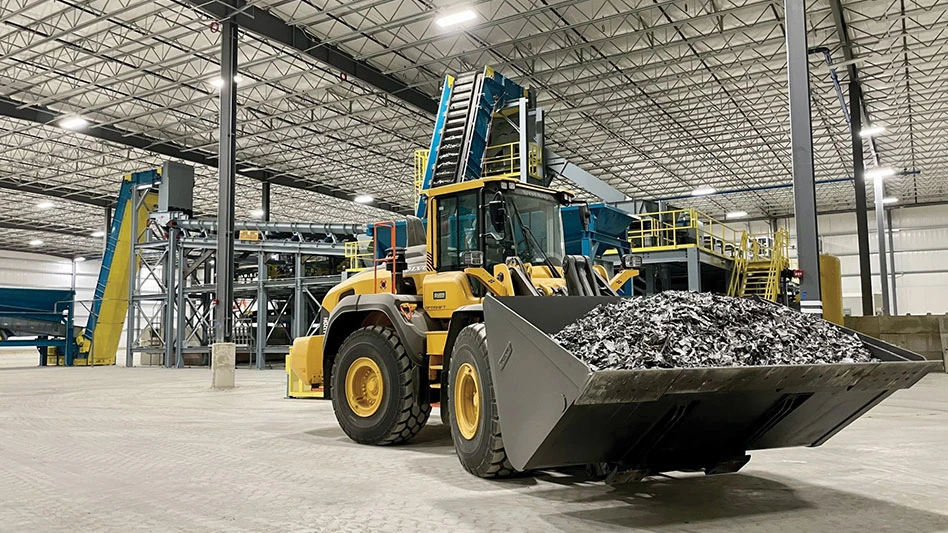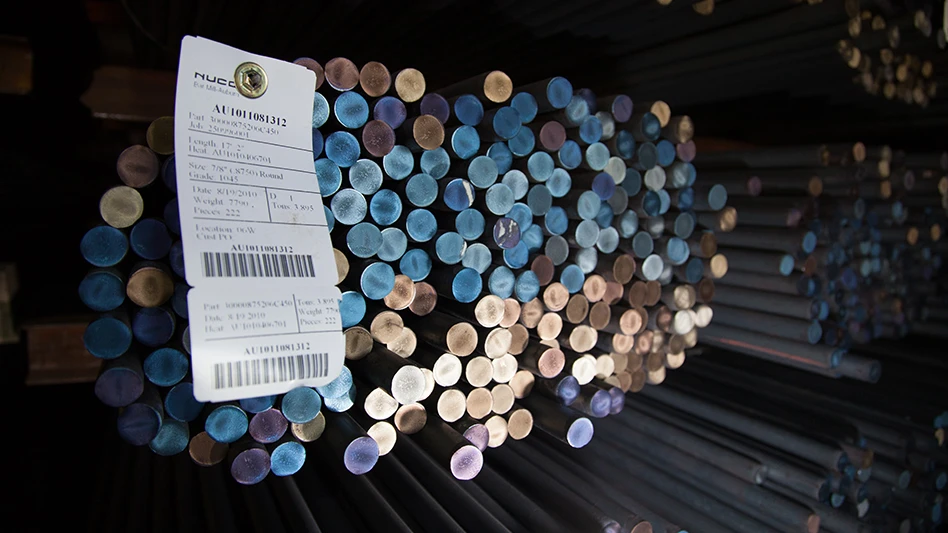Plastic bags have been a hot topic with city legislatures lately. As of May of 2008, 117 laws and ordinances to ban or tax the use of plastic bags or to promote the recycling of these bags were up for consideration, according to Phil Rozenski, director of environmental strategy for Helix Poly LLC, headquartered in Hartsville, S.C.
Rozenski spoke in June at Recycling Today’s Plastics Recycling Conference & Trade Show in Rosemont, Ill. Helix manufactures plastic bag and film products primarily out of high-density polyethylene (HDPE) film. The company also operates the Bag-2-Bag program, which helps to provide a plastic shopping bag destination for retailers at its North Vernon, Ind., recycling plant.
Rozenski said legislation seeks to address five primary goals: to improve recycling rates, to improve landfill diversion rates, to reduce consumption of oil and natural gas, to reduce litter and to reduce marine debris.
But it’s not just local legislatures that are eyeing plastic bags. Even retailers are turning up their noses at them. The grocery store chain Whole Foods Market announced early this year that it was discontinuing its use of plastic grocery bags at all of its 270 stores in the United States, Canada and the United Kingdom. And the home furnishings retailer Ikea also has decided to sack the sacks.
DEFENDING PLASTIC BAGS
In response to these efforts, Progressive Bag Affiliates of the American Chemistry Council, Arlington, Va., has challenged legislation that would ban or tax the use of plastic bags, instead promoting the responsible use and recycling of plastic bags. Legislation passed with support from the plastics industry includes California’s Assembly Bill 2449, which requires all grocery stores in the state to take back and recycle plastic grocery bags, and New York City’s plastic bag legislation, which requires any store that uses plastic bags and occupies 5,000 or more square feet or any chain with five or more locations to establish an in-store recycling program for plastic bags.
A number of manufacturers rely on recovered plastic bags and film for their manufacturing process, including Helix Poly, Mountain Valley Recycling of Delray Beach, Fla., and Trex, of Winchester, Va. Trex, a manufacturer of composite decking, fencing and railing material has invested some $30 million to refine its recycling process.
GETTING UNDERFOOT
According to Katie Walker, Midwest buyer for Trex, the company began as a division of Mobil Corp. formed by four Mobil executives in 1996. In April 1999, Trex split off and went public. The company’s headquarters, R&D and production plant are in Winchester and a second plant in Fernley, Nev., was added in July 1999. "These locations not only allow us to effectively source raw materials, but also to distribute our product effectively," Walker told attendees of the session "In the Bag and on Film" at Recycling Today’s Plastics Recycling Conference & Trade Show.
The raw materials used in the manufacturing of Trex’s products include reclaimed wood, shrink wrap and plastic bags. "Our process involves shredding bales of grocery bags and shrink wrap into a fluff and combing it with wood saw dust. These two components basically go through a mixing and heating process, and in the end you have a long continuous strand of composite lumber," she said.
According to Walker, the plastic protects the wood from moisture and insect damage, so there’s no rotting or splintering in the company’s finished product. "The wood protects the plastic from ultraviolet light damage and gives your deck a solid, natural feel," she said.
But when it comes to the controversy plastic bags are inspiring these days, Walker says, "The problem is not the plastic bags themselves, but the behavior of those consumers who toss them indiscriminately, littering streets, parks, beaches, lakes, rivers and seas."
She continued, "Banning bags, however, is a short-term solution that is economically unsound and creates a major inconvenience for most shoppers. And plastic bags are a fraction of the cost of paper bags. They are light, convenient and have a number of practical reuse applications." She added, "It takes a lot less energy to recycle a plastic bag than it does to recycle a paper bag."
The five states from which Trex sourced the most plastic bags in 2007 were Pennsylvania, with more than 177 million bags; North Carolina, with more than 163 million bags; Illinois, with more than 147 million bags; California, with more than 138 million bags; and Oregon, with more than 103 million bags.
Walker said Trex used a three-step program in sourcing plastic bags for its process: promotion, collection and consolidation. "We have been promoting recycling for more than 10 years. We’ve been out there speaking to recyclers, grocers and retailers trying to get the message out that we want this material," she said. "We can run these bags just as well as we can run resin."
She added, "The wrong message is out there among the general public that there is nothing people can do with these bags, and we are trying to get the word out that there are markets that do want them."
ADDRESSING THE PROBLEM
Helix Poly’s Rozenski said the environmental and ethical arguments of landfill diversion and a reduction in the consumption of energy and virgin material made recycling plastic bags appealing to consumers.
He said misconceptions and a lack of knowledge were behind many of the proposed bag bans. "In a lot of legislation it says that plastic is toxic," Rozenski said. "It says that you can’t economically recycle plastic."
He continued, "I was invited up to Iowa six weeks ago because a small county with only two stores was going to consider a ban. I went up there and met with the county council and explained the truth. They thought they could get bags that bio-degraded in the landfill, and they found out there was no such thing. There are a lot of these myths going around."
Rozenski said much of the proposed legislation had only addressed one or two of these items, "so it comes back around." He added, "You may take care of recycling, but if you don’t do something to address litter, they don’t feel satisfied."
To address this issue, Helix Poly created the Hilex environmentally degradable (HED) bag, a plastic T-shirt bag that is designed to degrade when littered and exposed to oxygen. "After decomposition, microbes digest the fragments, leaving behind natural by-products," according to the company’s Web site, www.helixpoly.com.
Rozenski described degradable additives as being "a little controversial" because as a new material if it is unrecyclable, "there’s no added benefit." He said, "Recycling is a priority, but degradable additives may have a place if it does not influence recycling. That is very critical."
Rozenski evaluated a variety of measures for reducing the environmental impact of plastic bags, including degradable bags, compostable bags, open- and closed-loop recycling and bag reduction and optimization programs. He also looked at recycled-content degradable bags and recycled and degradable bags with a reduction plan, which he referred to as "hybrid" programs. "As a stand-alone program the thing that works the best is bag reduction," he said. However, he said he saw the most promise overall in the hybrid models because they addressed all the concerns that legislation was trying to address.
"One thing I will say about compostable and degradable bags that stand alone is that they’re fighting litter, but they’re not recycling," he said. "We need to urge people to invest in technology to find out how they can be incorporated with recycling. Recycling is the basis for all of this."
Recycling certainly plays a prominent role in environmental sustainability and the greening of business and industry.
SEEING GREEN
"The marketplace is demanding sustainability solutions," said Richard Moody of Mountain Valley Recycling, a company that recycles millions of pounds of plastic film and plastic hangers into recycled resins. "These solutions are no longer about boutique eco-brands, no longer about compliance with local ordinances and regulations. Environmental sustainability is about driving cost savings through efficiencies, about creating new markets and securing competitive advantages. We believe what is good for the environment is also good for business."
Moody cited the KPMG LLC 2007 Annual National Shopping Behavior survey, saying 74 percent of the respondents indicated that they already bought environmentally friendly products. He said 60 percent of respondents indicated they were willing to pay more for eco-friendly products, while 55 percent of the respondents made a special effort to patronize retailers with a green reputation.
"Closing the loop is not just a catch phrase anymore," he said. "Today, it’s an effective business strategy where you can turn plastic waste into products with a purpose. Closing the loop creates sustainable and diversified markets that are not seasonal because the supply and the demand are built in. Closing the loop helps retailers and distributors gain a leadership position by educating shoppers, store associates and legislatures through environmental campaigns and product offerings, by creating tangible recycling programs and environmental incentives with sustainable products."
Recycling Today’s Plastics Recycling Conference was held in Rosemont, Ill., June 22-24. The 2009 event will be held in Atlanta June 7-9.
The author is managing editor of Recycling Today and can be contacted at dtoto@gie.net.
Latest from Recycling Today
- Indiana county awarded $65K recycling grant
- Mixed paper, OCC prices end year on downward trend
- Updated: CAA submits final draft program plan in Oregon
- Enviri names new president of Harsco Environmental business
- Survey outlines ‘monumental challenge’ of plastic packaging collection in UK
- Nippon Steel acknowledges delay in US Steel acquisition attempt
- BASF collaborates to study mechanical plastic recycling
- Commentary: navigating shipping regulations for end-of-life and damaged batteries





